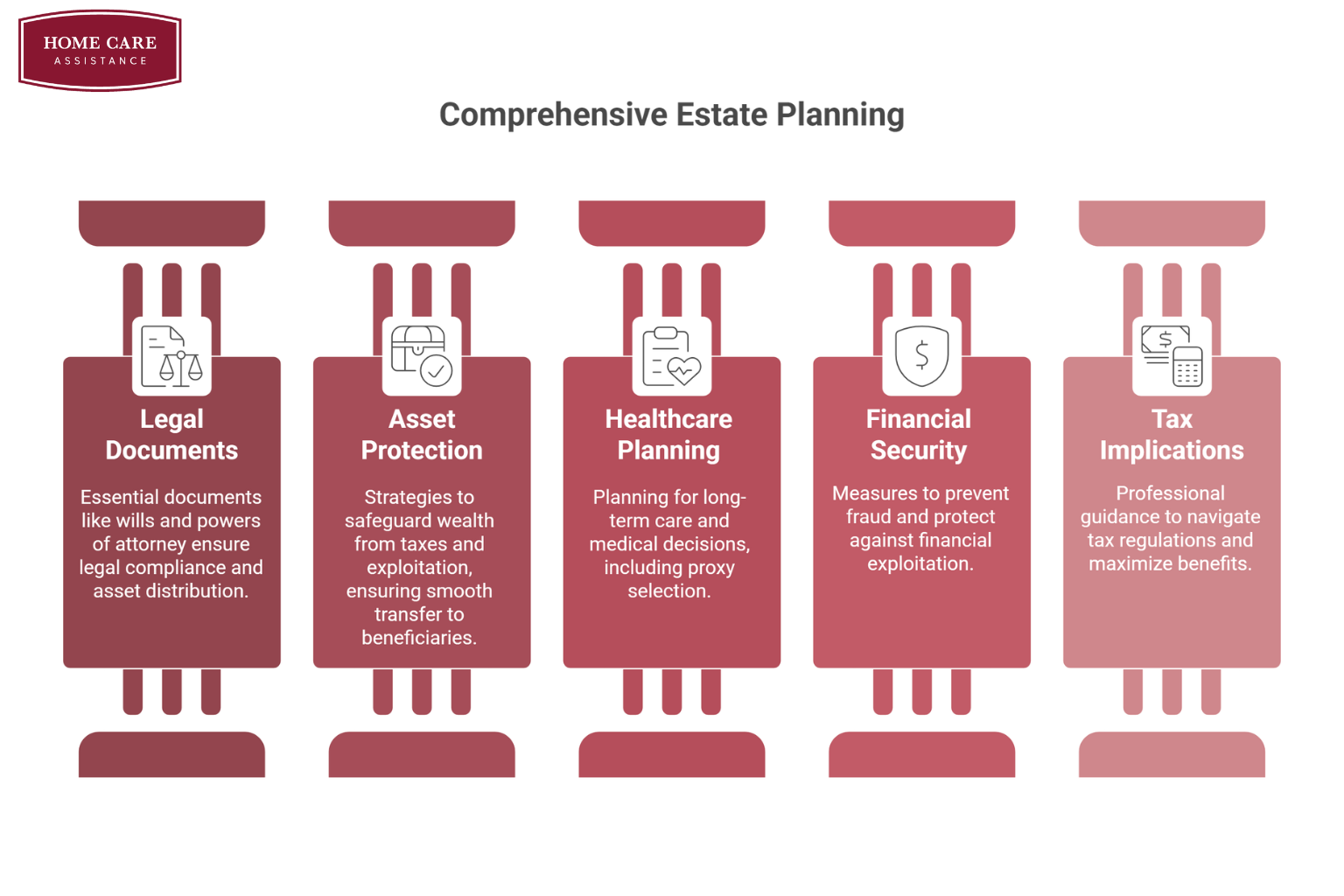Table of Content
- 1 Essential Legal Documents Every Senior Needs
- 2 Will and testament
- 3 Power of attorney documents
- 4 Advanced healthcare directive
- 5 Understanding Asset Protection and Distribution
- 6 Trust structures
- 7 Beneficiary designations
- 8 Joint ownership considerations
- 9 Healthcare Planning and Decision-Making Authority
- 10 Long-term care planning
- 11 Healthcare proxy selection
- 12 Financial Security and Fraud Prevention
- 13 Tax Implications and Professional Guidance
- 14 Gift and estate tax planning
- 15 Professional team assembly
Estate planning becomes increasingly important as our senior loved ones age, yet many families postpone these crucial conversations. Creating a comprehensive estate plan ensures your aging family member’s wishes are honored while providing peace of mind for everyone involved.
Essential Legal Documents Every Senior Needs
A complete estate plan requires several key documents that address different aspects of end-of-life planning and asset distribution. Each document serves a specific purpose and works with the others to create comprehensive protection.
-
Will and testament
- Designates how assets will be distributed after death
- Names guardians for minor children if applicable
- Specifies funeral and burial preferences
- Appoints an executor to manage the estate
-
Power of attorney documents
- Financial power of attorney allows someone to manage money and property.
- Healthcare power of attorney permits medical decision-making.
- Should be established while your loved one has mental capacity
- Can be immediate or activated only when incapacitation occurs
-
Advanced healthcare directive
- Living wills specify desired medical treatments.
- Do-not-resuscitate orders provide clear instructions to medical personnel.
- HIPAA authorization allows family access to medical information.
- Physician orders for life-sustaining treatment (POLST) cover specific medical scenarios.
Understanding Asset Protection and Distribution
Proper asset management protects your loved one’s wealth from unnecessary taxes, probate costs, and potential financial exploitation while ensuring smooth transfer to beneficiaries.
-
Trust structures
Revocable living trusts allow assets to pass directly to beneficiaries without probate court involvement. These trusts maintain flexibility during your loved one’s lifetime while providing privacy and efficiency after death. Irrevocable trusts offer additional tax benefits but limit the grantor’s control over assets.
-
Beneficiary designations
Retirement accounts, life insurance policies, and investment accounts require current beneficiary information. Regular reviews ensure these designations align with overall estate planning goals and reflect any family changes like marriages, divorces, or deaths.
-
Joint ownership considerations
Joint accounts and property ownership can simplify asset transfer but may create unintended consequences. Understanding the difference between joint tenancy with right of survivorship and tenancy in common helps families make informed decisions about property ownership structures.
Planning for your loved one’s future should also include considerations about his or her ability to continue aging in place. Living alone at home in the golden years can present a few unique challenges. Trust senior care professionals to help your senior loved one maintain a higher quality of life while he or she lives with an illness and performs the daily tasks of living.
Healthcare Planning and Decision-Making Authority
Healthcare planning extends beyond basic medical directives to encompass long-term care needs, insurance considerations, and quality-of-life preferences that guide family decision-making during difficult times.
-
Long-term care planning
- Research Medicare and Medicaid benefits for nursing home or home healthcare costs.
- Consider long-term care insurance options while your loved one is healthy.
- Evaluate aging-in-place modifications versus assisted living facilities.
- Plan for potential cognitive decline and specialized memory care needs.
-
Healthcare proxy selection
Choose healthcare decision makers who understand your loved one’s values and can make difficult medical choices under pressure. Primary and backup healthcare proxies should live nearby and be willing to advocate for your loved one’s wishes even when family members disagree.
Some seniors only require help with a few daily tasks so they can maintain their independence. However, those living with serious illnesses may need more extensive assistance. Luckily, there is professional live-in care Auburn, AL, seniors can rely on. Home can be a safer and more comfortable place for your loved one to live with the help of an expertly trained and dedicated live-in caregiver.
Financial Security and Fraud Prevention
Aging adults face increased vulnerability to financial exploitation and scams that can devastate carefully planned estates. Implementing protective measures safeguards assets while maintaining appropriate independence.
Based on current financial fraud trends targeting seniors, protective strategies include:
- Setting up account alerts for unusual transactions or spending patterns
- Establishing trusted contact persons with financial institutions
- Creating limited-access accounts for online purchases or daily expenses
- Implementing two-factor authentication on all financial accounts
- Regularly reviewing credit reports for unauthorized accounts or activity
Family members should establish clear communication protocols about financial decisions and create verification procedures for any requests involving money transfers or account changes.
Tax Implications and Professional Guidance
Estate planning involves complex tax considerations that require professional expertise to navigate federal and state regulations while maximizing benefits for your loved one and their beneficiaries.
-
Gift and estate tax planning
Current federal estate tax exemptions allow significant wealth transfer without tax consequences for most families. However, state estate taxes may apply at lower thresholds, making professional tax planning essential for larger estates.
-
Professional team assembly
Estate planning requires coordination among estate planning attorneys, tax professionals, financial advisors, and insurance specialists. Each professional brings specific expertise that contributes to a comprehensive plan addressing legal, financial, and tax considerations.
Regular plan reviews ensure documents remain current with changing laws, family circumstances, and your loved one’s evolving needs and preferences.
It’s also essential to determine your loved one’s preferences for continuing to live at home as he or she gets older. One of the most challenging tasks of helping an elderly relative age in place safely and comfortably is researching agencies that provide at-home care. Auburn families can turn to Home Care Assistance for reliable, high-quality in-home care for aging adults. We offer 24-hour live-in care for seniors who require extensive assistance, and we also offer respite care for family caregivers who need a break from their caregiving duties.

